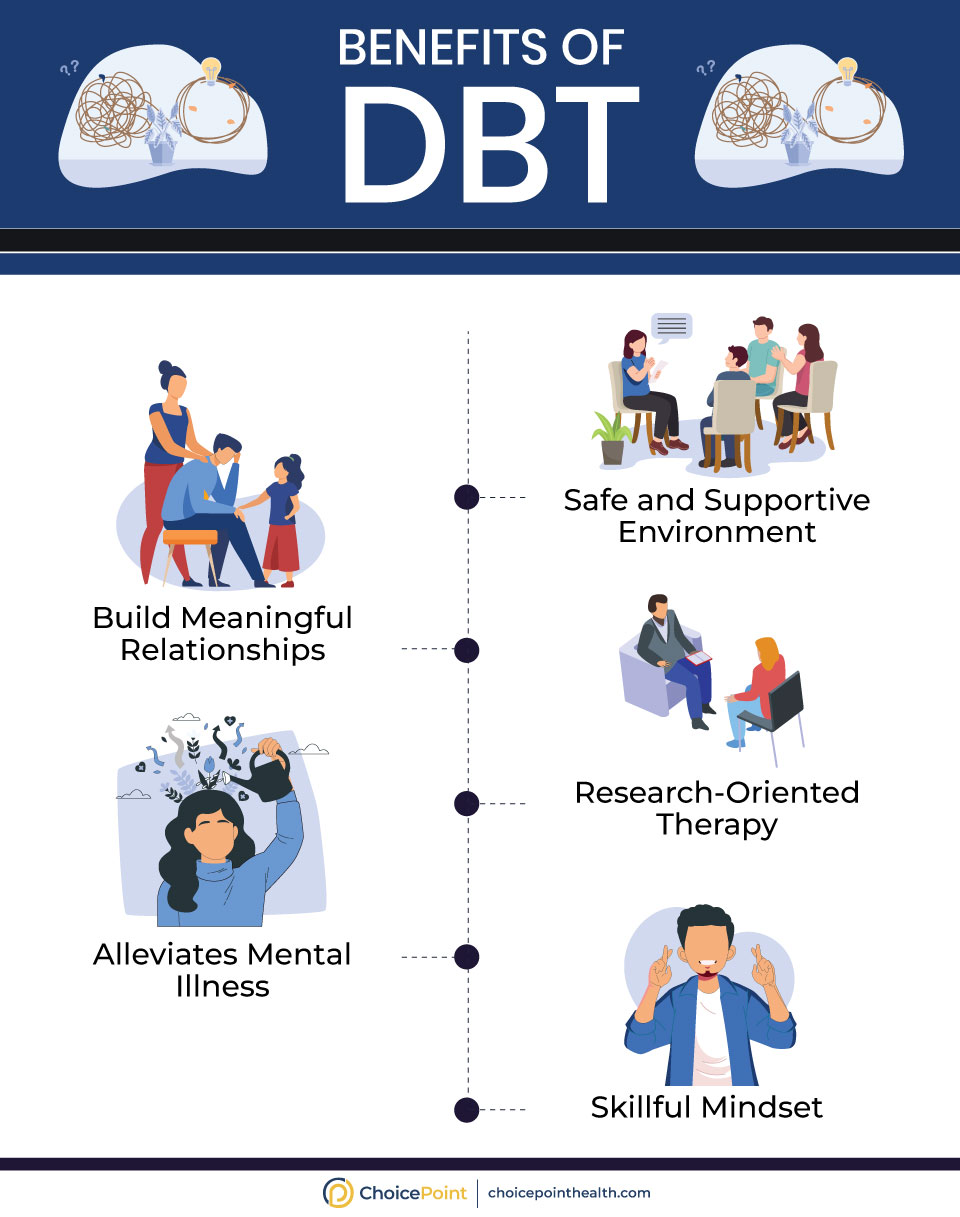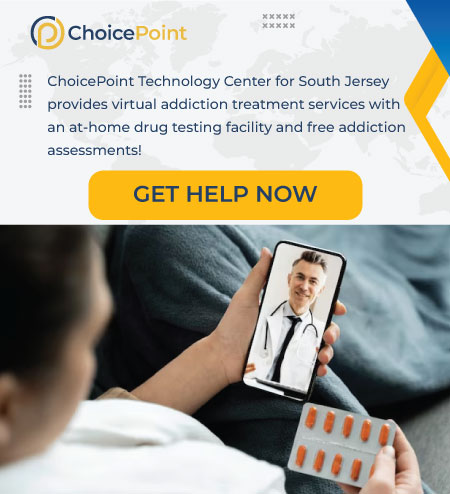In 2023, Jersey State received 27.7% of adults reporting symptoms of anxiety and depressive disorders. Such mental illnesses often come along with substance use disorder. People prefer to go for Online DBT in South Jersey Rehab Center, but addressing the underlying cause through proper addiction treatment is necessary to cover the comorbidity fully. Let’s read what you can opt to avoid worsening mental health and substance use disorder simultaneously.
ChoicePoint Technical Center provides virtual DBT sessions incorporated with addiction treatment for South Jersey residents; call Now 844.445.2563 to consult your treatment options!
Table of Contents
DBT Program in South Jersey for Addiction: How Is It Effective?
DBT stands for dialectical behavioral therapy. Dialectical refers to two opposed goals in a patient such as:
- Change
- Acceptance
As Dr. Linehan proposed, DBT is for those who want themselves dead but do not solve the underlying issues to make their life worth living.
DBT program works on four basic principles to ensure change and acceptance for maintaining abstinence from addiction:
- Mindfulness: It brings awareness to your current flaws and allows you to accept them.
- Emotional regulation: Teaches to deal with heightened emotions such as anger and sorrow.
- Distress tolerance: Helps to develop coping skills to manage stressful and rough situations.
- Interpersonal effectiveness: Develops the confidence to say no to destructive things and put up an assertive mindset.
Collectively, these approaches target the mental irregularities that lead to mental illness, such as:
- Post-traumatic stress disorder
- Substance use disorder
- Anxiety
- Depression
- Borderline personality disorder
- Suicidal behavior
However, if a person has comorbidity, only a comprehensive addiction treatment under a psychologist specializing in addiction will help to achieve robust outcomes.
To get addiction treatment along with DBT in South Jersey, contact ChoicePoint Technical Center 844.445.2563.
How DBT Works for Substance Use Disorders?
Going for virtual DBT sessions for substance use disorders can be a daunting task but gets a bit easy if prerequisite knowledge is obtained of how the therapy works in recovery from substance use disorder.
Usually, DBT works in four stages for addiction recovery
Stage 1
The first stage begins with identifying the negative behavior that becomes the reason for substance use, which paves the way for learning helping behavior that controls emotions.
Stage 2
The majority of addictions are induced as a result of traumatic experiences in the past that become the result of mental health disorders such as:
- Post-traumatic stress Disorder
- Acute Stress Disorder
This is where intense DBT, along with other psychotherapies, work to alleviate mental illness and psychological dependence on substances.
Stage 3
This is a relatively mild stage where the individuals will work on interpersonal relationships and self-confidence to reduce negative behavior and emotions.
Stage 4
Last stage, psychologists work on helping patients move forward in life and build a mindset that prevents relapse and allows them to enjoy the most out of life.
How Do I Start Online DBT in South Jersey Rehab
Steps that one should take to start their Online DBT for addiction
- Look online for HIPAA-compliant and CARF-accredited virtual addiction rehab facilities.
- Complete your initial assessments, contracts, financial management, and insurance verification.
- Confirm your addiction treatment plan integrated with DBT after the E-registration process.
- Begin your DBT session after completing rehab and withdrawal management from substance abuse.
- Maintain your sobriety and keep healthy mental health with an aftercare recovery plan after DBT.

Dialectical Behavior Therapy (DBT) for Addiction Treatment
Online DBT South Jersey: A Comprehensive Guide for Addiction Treatment
Although DBT has proven to be a perfect standalone for treating SUDs. But, for a substance abuse treatment to be effective and worth lifelong, a DBT-integrated addiction treatment program should be opted for. Let’s give it a read about how you can start online DBT combined with addiction treatment virtually.
Dialectical Behavior Therapy for Dual Diagnosis
The majority of people struggling with addiction inflict self-harm and suicidal behavior that leads to Bipolar Disorder. For such co-occurring disorders, combining DBT with dual diagnosis can reduce the stigma by treating:
- Substance abuse disorders such as alcohol or drugs
- Mental health disorders such as BPD, PTSD
Psychologists administering dual diagnosis will perform pre-DBT assessments and virtual addiction assessments to categorize the individual’s behavior and severity of addiction.
Virtual MAT Before DBT
After careful evaluation, if a person seems to show withdrawal symptoms associated with substance use, practitioners will dispense FDA-approved medication while under their DEA-certified staff’s constant virtual surveillance:
- Subutex for opiate dependence (prescription opioids)
- Suboxone for opioid use disorders
- Naltrexone for alcohol dependence
- Buprenorphine for both alcohol and opioid dependence
The benefit of getting virtual DBT is that one can get a same-day prescription for whichever substance use disorder a person has after evaluation and E-registration.
Psychotherapy: DBT for Mental Illness
Let’s come to the point where actual mental therapy starts after a person has recovered from physical withdrawal symptoms. Two important psychotherapies are combined:
DBT alone is only worthwhile for alleviating emotional disturbances that lead to self-destruction and suicidal thoughts. However, it is based on CBT, where a person can develop skills to positively tackle problems and stressful situations.
None of the therapies alone is as effective as those administered combined. So, whenever looking for DBT for substance use disorder, it is advisable to go with a full-fledged addiction treatment program that incorporates both therapies to get the most out of it.
Get Virtual Counseling To Prevent Relapse After DBT
As depicted above, full-fledged addiction treatment combined with DBT will contain personal therapy sessions to determine the mental health condition and dispense psychological treatment accordingly.
Addiction Counseling for Personality Development
For personality disorders, psychologists specializing in addiction treatment will perform.
- Individual therapy to improve interpersonal skills and personal development
- Group therapy reduces social anxiety and boosts self-confidence
- Family therapy improves familial and friend relationships
DBT alone will never be able to address these personality disorders that come along with substance use, and that is where online counseling can reduce the stigma of long-term treatment plans.
Aftercare Plan for Long-Term Sobriety
Even if a person has gone through all the aspects of addiction treatment and completed the rehab process with good results, sobriety is never guaranteed. To maintain long-term abstinence from addiction and keep a check on mental health after DBT, one may adopt an aftercare recovery plan that includes:
- Virtual counseling sessions
- Co-curricular activity plan
- Relapse prevention skills
- Stress coping skill teachings
For addiction treatment encompassing DBT and aftercare plan in South Jersey. Contact ChoicePoint Technical Center to get quick assistance 844.445.2563.
Want to Schedule a Virtual Appointment for DBT In South Jersey Rehab Center?
As of now, you know addiction treatment is integrated with DBT in South Jersey. ChoicePoint Technical Center in New Jersey offers virtual and inpatient services for the residents of South Jersey. Contact our certified staff to get your addiction and DBT-related queries or appointments. We also offer specialized treatment plans such as for:
So that you can avail yourself of the best possible care virtually at home 844.445.2563, we also offer at-home drug testing services so we can understand your severity before beginning treatment!
Common FAQs Regarding DBT and Addiction Counseling
One may have some questions in mind when looking for DBT and addiction counseling, such as
Can I Do DBT on My Own?
You might be able to perform a handful of components of DBT. Still, being a complex, professionally oriented therapy, it always requires consultation from a psychologist to achieve an effective outcome.
How Is DBT Different From CBT?
Both are forms of psychotherapies, with CBT focusing on learning new ways to mend negative behavior. At the same time, DBT is based on CBT, which relies on controlling irregularities of emotions and acceptance of personality flaws.
Who Should Not Opt for DBT?
People with
- Intellectual disabilities
- Uncontrolled schizophrenia
- Traumatic childhood experiences
- Parental disputes
show low self-esteem and lack of motivation, where DBT becomes ineffective. For such cases, only a comprehensive addiction treatment that addresses all the underlying issues can be the best solution.
What are the Disadvantages of DBT?
If you are an addiction-struggling person looking for DBT, it might not suit you well because its ineffectiveness in
- Other mental illnesses such as personality disorders, social anxiety
- Requires other forms of therapy to become result-oriented
- Overly complex if done alone
- Lack of proper psychological guidance can result in a waste of time
Is DBT only for people with Borderline Personality Disorder?
Although DBT was initially created for people with BPD, it has proven to be effective in a lot of mental health illnesses and co-occurring disorders, such as substance use disorder and mental disorders, governing the process with psychological approaches.
What Are My Payment Options for Dbt South Jersey Rehab?
The good thing is that DBT is covered in the majority of insurance and payment plans, such as
- Tricare
- Medicare
- Commercial Insurance
- Personal Funds
You may verify your insurance with the concerned rehab before beginning the process.
Medical Disclaimer:
ChoicePoint aims to improve the quality of life for people struggling with substance use disorder and mental health issues. Our team of licensed medical professionals research, edit and review the content before publishing. However, this information is not intended to be a substitute for professional medical advice, diagnosis, or treatment. For medical advice please consult your physicians or ChoicePoint's qualified staff.











Review How Do I Start Online DBT in South Jersey Rehab Center.